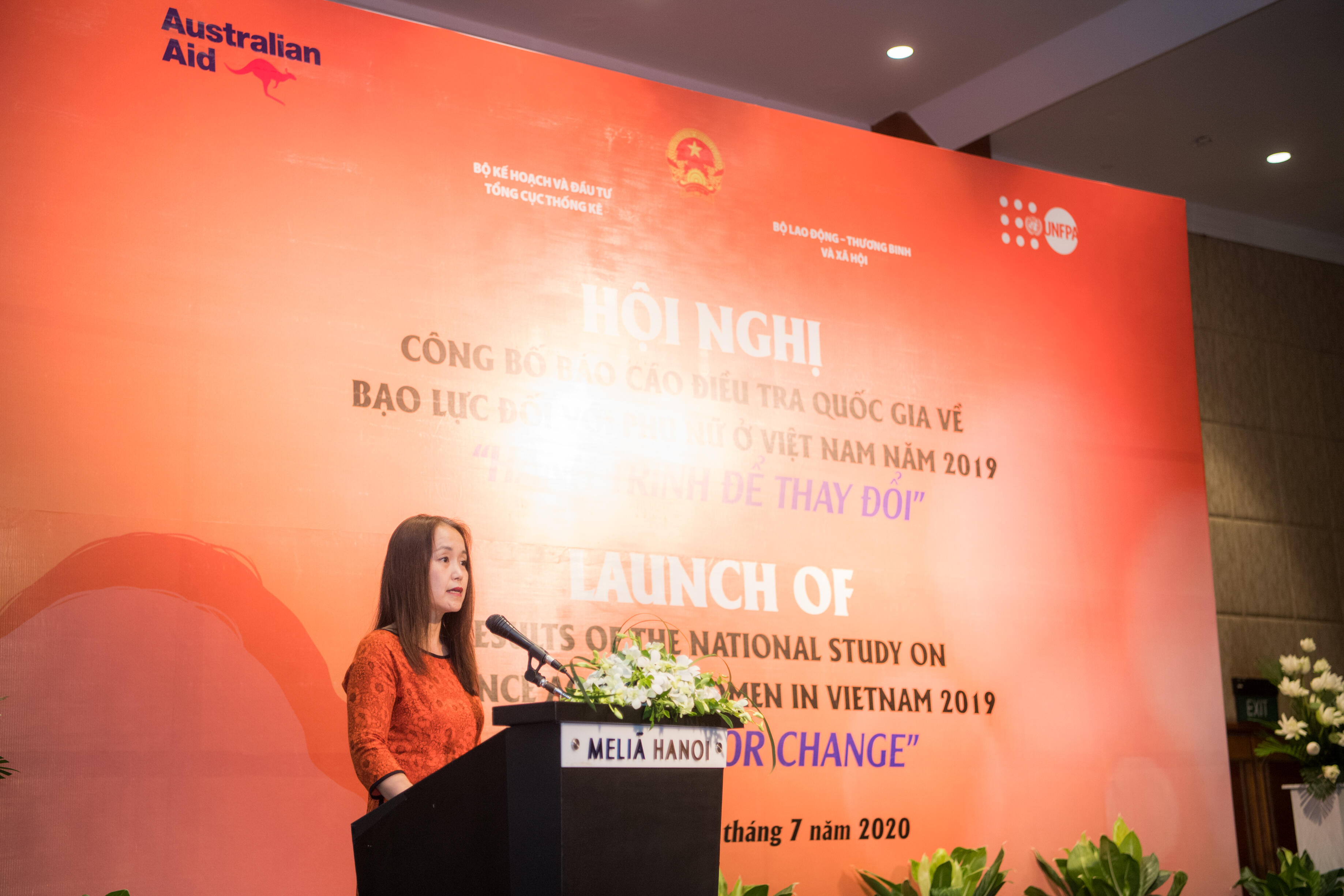Honorable Vice Minister of Labour, Invalids and Social Affairs, Madame Nguyen Thi Ha;
Honorable Mr Pham Quang Vinh, Deputy Director General of the General Statistics Office;
Excellency, Ms. Robyn Mudie, Australian Ambassador to Viet Nam;
Distinguished guests, Representatives from Government Ministries, social organizations, and research institutes; Embassies, International development partners, NGOs, UN colleagues; young people and media fellows,
Ladies and gentlemen,
I am much honored to be here today to disseminate the results of the 2nd national study on violence against women in Viet Nam, which was conducted in 2019. Viet Nam is the only country in the world so far, which has successfully conducted the study on violence against women for the second time, and this was made possible with technical and financial support from the Government of Australia through its Department of Foreign Affairs and Trade (DFAT) and UNFPA. The second study allows us all to better understand what has changed and what has not changed, and what needs to be in place for further change to eliminate violence against women in Viet Nam.
I would like to express my sincere appreciation to MOLISA, GSO, and other Government organisations, NGO partners including CCHIP, and DFAT for their tireless efforts throughout the study over the last two years, from localization and finalisaiton of questionnaires to training of interviewers, data compilation and analysis, as well as report writing and its supplementary documents to make it reader and user friendly. Having done different kinds of surveys in the world, I can attest to how immense the work has been and how much everyone’s energy has gone into it to bring the whole exercise at the level we have today.
Ladies and gentlemen,
This report is a landmark. We now have renewed evidence – the true story - about the reality in Viet Nam, of women’s experience of violence at home, at work, and in public place, usually from their husbands and partners, but also from non-partners. This is a huge step forward in our efforts to prevent and end violence against women – and to strengthen services and support needed to victims of violence.Violence against women is one of the most pervasive human rights violations that exist in many countries in the world, including Viet Nam. Violence against women may occur in a multitude of different contexts, including home, workplace, public and social spaces.
Data from the 2019 study shows that nearly 2 in 3 women (62.9 per cent) experienced one or more forms of physical, sexual, emotional, and economic violence and controlling behaviours by their husbands in their lifetime, and 31.6 per cent currently (in the last 12 months). But almost all women (90.4 per cent) who experienced physical and/or sexual violence from husbands did not seek any help from formal service providers, largely because of the fear of stigma, discrimination and further harassment. It means that violence against women in Viet Nam is very much hidden, and the 2019 survey that we are launching today is to disclose such untold stories, so that we can take immediate action to prevent and eliminate violence against women. In Viet Nam, the home, which should be a place of love, comfort, and security, does not necessarily seem to be, for too many Vietnamese women – and for their children – a safe place to be.
The impact of violence goes well beyond the immediate physical or emotional harm caused. The 2019 study confirms that violence against women causes long term stress, ill-health, and trauma, and it stays for life, and it is particularly concerning that pregnant women are at risk of being beaten, punched or kicked during pregnancy, leading to miscarriage, stillbirths and abortion. Children are also victims when living in a household where their mother was beaten, with serious risks for their well-being. The study proves that violence is a learned behavior, and it estimates that 4.4% of women did experience child sexual abuse before the age 15.
Ladies and Gentlemen,
Without addressing the issue of violence against women, there is no way that Viet Nam can achieve the Sustainable Development Goals by 2030. We have only 10 years left to do that. And according to the study report, violence against women is costing Viet Nam an estimated 1.8% of GDP in 2018. This is huge.
The 2019 study however shows some positive lights as well, which we need to tap into for our policy and programme agenda. For instance, except sexual violence, all forms of violence were lower in 2019 than in 2010. And this is more pronounced amongst young generations. Also, the 2019 report witnessed change in gender norms amongst young people to the progressive direction. These mean that we must make right investment on young people to accelerate change in eliminating violence against women.
Ladies and Gentlemen
To conclude, I would like to extend our sincere appreciation and immense respect to those who were interviewed in the study, for their courage and their will to make change. As a woman and as a mother, I want to call on other women in Viet Nam – as leaders, businesswomen, mothers, sisters, and daughters – to speak up against violence, and I quote a woman who was interviewed in the study. She said “I say this to other women, “If you feel like you can endure then endure, otherwise find a way to live for yourself. We should not be so afraid of the stigma, rather than we bury ourselves in a prison.”
Thank you very much for your attention and participation.


